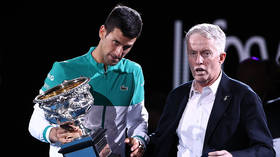Australian court gives exact reasoning for Djokovic deportation

The Federal Court in Australia has revealed its motives for rejecting the challenge made by world tennis number one Novak Djokovic over the government's decision to cancel his visa.
At the end of a fortnight-long saga, the Serb arrived back in his homeland on Monday after being deported from Australia despite having a medical exemption to defend his Australian Open crown.
On Sunday, Djokovic's attempt to have the cancelation overturned failed as a trio of Federal Court judges agreed unanimously to dismiss his application.
Chief Justice James Allsop, Justice Anthony Besanko, and Justice David O'Callaghan jointly said that Immigration Minister Alex Hawke had been neither irrational nor illogical in canceling the 34-year-old's visa, though "the merits or wisdom of the decision" were not taken into account.
Hawke had argued that the unvaccinated Djokovic's continued presence in Australia could incite anti-vaxx sentiment among the local population.
On Thursday afternoon, more specific reasons for the ruling were revealed with the court stating: "An iconic world tennis star may influence people of all ages, young or old, but perhaps especially the young and impressionable, to emulate him.
"This is not fanciful; it does not need evidence. It is the recognition of human behavior from a modest familiarity with human experience," it insisted.
"Even if Mr. Djokovic did not win the Australian Open, the capacity of his presence in Australia playing tennis to encourage those who would emulate or wish to be like him is a rational foundation for the view that he might foster anti-vaccination sentiment."
On the topic of the 20-time Grand Slam winner's central argument that Hawke lacked evidence and failed to cite any with regards to his presence Down Under fostering "anti-vaccination sentiment," the court said it was "open to infer that it was perceived by the public that Mr. Djokovic was not in favor of vaccinations."
"It was known or at least perceived by the public that he had chosen not to be vaccinated," the court added, while noting that Hawke was not obliged to provide a statement detailing the reasons of the case yet still did.
"They were evidently carefully drafted," the court claimed. "There was a clear interrelationship among all parts of the Minister's reasons. The themes of encouragement and emulation of a sporting hero and icon run through the reasons for satisfaction as to health and good order and the public interest."
Arguing it was not irrational for Hawke to have concerns that anti-vaxx support for Djokovic's position on vaccination might encourage protests that may lead to increased Covid transmission, the court conceded however that questions remain as to what extent "one can or should characterize lawful, even if robust, rallies and protests in the free expression of political or social views… as a threat to good order."
Additionally, it was noted that another person in Hawke's position might not have canceled the visa at all.
"The Minister did," it highlighted. "[But] the complaints made in the proceeding do not find a conclusion that the satisfaction of the relevant factors and the exercise of discretion were reached and made unlawfully."
It was claimed in the UK on Thursday that Djokovic was in talks with lawyers about potentially suing the Australian government to the tune of more than $4 million, which would include prize money he stood to earn as the potential winner of a tournament has he claimed a record nine time previously.
Djokovic could find himself barred for Australia for the next three years under the terms of his visa cancelation, unless the authorities find "compelling reasons" to allow him to return.













